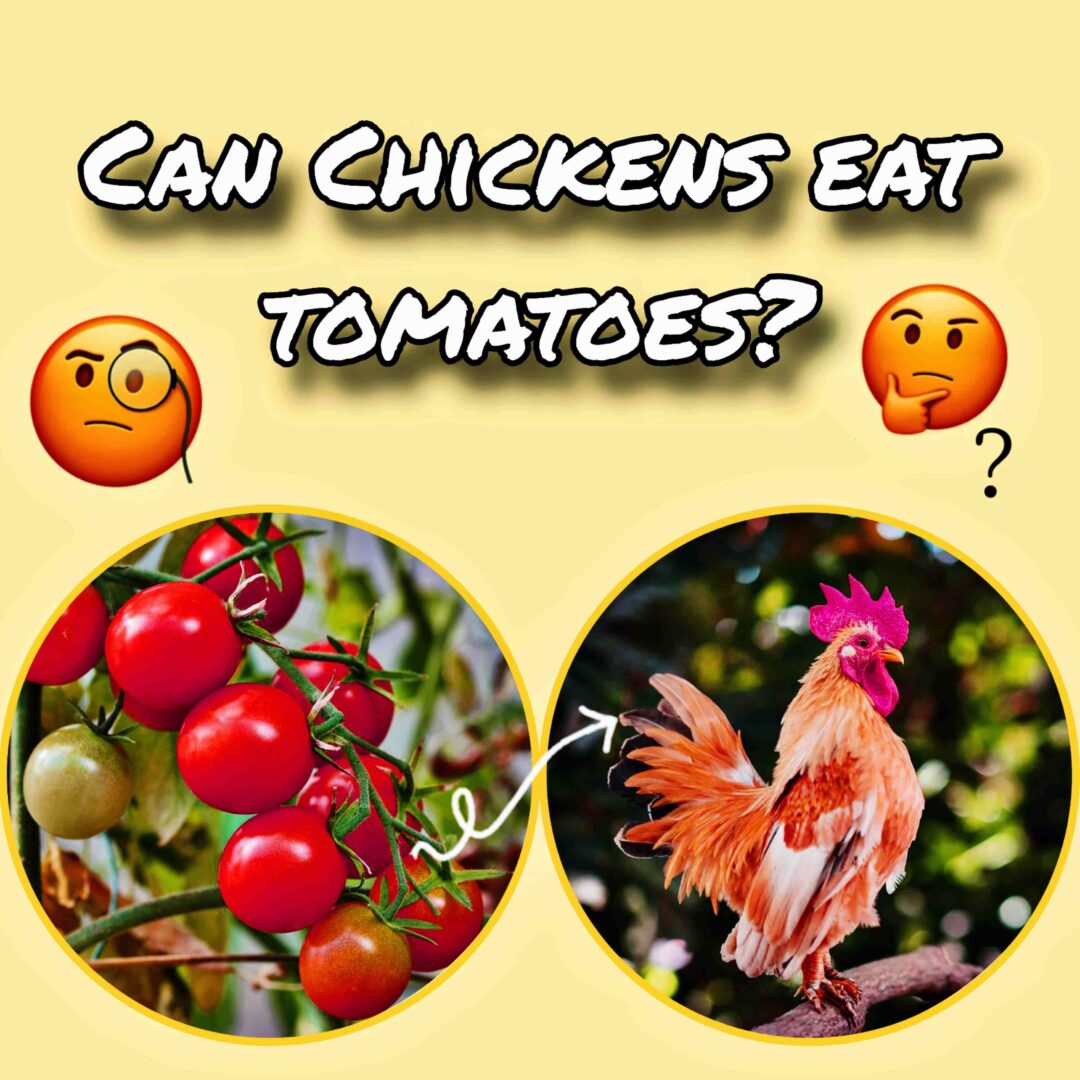Can Chickens Eat Tomatoes?
In the world of poultry care, providing a varied diet is essential for maintaining the health and well-being of chickens. Tomatoes are secure and nutritious for chickens, but most effective the ripe, crimson components. Green, unripe tomatoes, as well as the leaves and stems of the tomato plant, include solanine, which is toxic to chickens. So, make sure you’re handiest offering ripe tomatoes, and your chickens will in all likelihood enjoy this juicy treat. When a tomato is unripe, it includes solanine which is toxic to chickens. Make sure any tomatoes you supply on your chickens are fully ripe!
Tomatoes aren’t excellent for chickens whilst you haven’t mounted a healthful weight loss program of feed. Tomatoes and different treats have to simplest make up 5 – 10% of a bird’s weight-reduction plan so be sure you don’t overfeed tomatoes to the factor where your chickens are forgetting the main meal!
Understanding Chicken Nutrition
Nutritional Requirements for Chickens
Chickens require a balanced food plan to thrive. Their eating regimen need to consist of a mixture of proteins, carbohydrates, fat, nutrients, and minerals. Commercial poultry feeds are designed to meet those nutritional needs, however supplementing with diverse treats can offer extra benefits and beautify their first-rate of life.
Common Foods for Chickens
Typically, chickens consume grains, seeds, greens, fruits, and bugs. Each of these food types contributes vital nutrients to their weight loss plan. Ensuring a varied eating regimen helps to save you boredom and promotes herbal foraging behaviors.
Tomatoes: Nutritional Breakdown
Nutritional Value of Tomatoes
Tomatoes are a wealthy supply of several key vitamins. They provide substantial quantities of vitamins A and C, potassium, and antioxidants like lycopene. These vitamins can be useful to chickens, promoting general health and properly-being.
Types of Tomatoes
Tomatoes are available various kinds, along with cherry, grape, Roma, and beefsteak. While each type has a slightly exclusive nutrient profile, all proportion not unusual factors that can effect chickens. It’s critical to bear in mind these factors when figuring out how to include tomatoes into their food regimen.
Feeding Tomatoes to Chickens
Safety of Ripe Tomatoes
Ripe tomatoes are generally safe for chickens to consume. They offer valuable nutrients that can complement their standard feed. However, they should be given in moderation to avoid potential issues.
Risks Associated with Green Tomatoes and Plant Parts
Green tomatoes and other parts of the tomato plant, such as stems and leaves, contain solanine—a toxic compound that can cause health issues in chickens. Solanine can lead to symptoms such as gastrointestinal distress and more severe health problems if ingested in large quantities.
Preparing Tomatoes for Chickens
Proper Preparation Techniques
To safely feed tomatoes to chickens, it’s crucial to prepare them correctly:
- Remove Green Parts: Ensure that all green stems, leaves, and unripe tomatoes are removed before offering them to chickens.
- Cut into Small Pieces: To prevent choking and ensure easy consumption, cut tomatoes into small, manageable pieces.
- Serve Fresh or Cooked: Chickens can consume both raw and cooked tomatoes. Cooking may make them easier to digest, but avoid adding any seasoning or salt.
Serving Size and Frequency
Tomatoes should be considered a treat and not a staple of your chickens’ diet. Limit tomato servings to once or twice a week and ensure that they constitute no more than 10% of your chickens’ total diet. This helps maintain a balanced nutritional intake.
Benefits of Feeding Tomatoes to Chickens
Nutritional Benefits
Tomatoes are rich in vitamins A and C, which can support the immune system and promote healthy feather growth. The antioxidants in tomatoes, particularly lycopene, can contribute to overall health and help combat oxidative stress.
Enhancing Chicken Health
Incorporating tomatoes into your chickens’ food regimen can upload variety and stimulate natural foraging behaviors. This can assist reduce boredom and inspire greater active and engaging conduct.
What to Avoid When Feeding Chickens
Toxic Parts of Tomato Plants
Avoid giving chickens any green elements of the tomato plant, which includes leaves, stems, and unripe tomatoes. These elements incorporate solanine and can be toxic to chicken.
Processed Tomato Products
Processed tomato products, which includes ketchup and sauces, have to be averted. These merchandise often comprise introduced sugars, salts, and other elements that are not appropriate for chickens and may lead to fitness issues.
Other Safe Treats for Chickens
Fruits and Vegetables
In addition to tomatoes, chickens can revel in a number of other fruits and vegetables. Safe alternatives encompass apples (without seeds), berries, carrots, and cucumbers. These should be introduced step by step and monitored for any damaging reactions.
Homemade Treat Ideas
Homemade treats like oatmeal or scrambled eggs may be nutritious additions in your chickens’ weight loss plan. Ensure those treats are free from harmful components inclusive of salt or spices.
Monitoring Your Chickens’ Health
Signs of Digestive Issues
After introducing tomatoes or any new deal with, screen your chickens for symptoms of digestive problems, consisting of diarrhea or unusual droppings. Adjust their diet as wanted primarily based on their reactions.
Adjusting Diet Based on Observations
Use observations of your chickens’ health and behavior to fine-tune their diet. This helps ensure they receive a balanced and healthy diet that supports their overall well-being.
Expert Insights
Veterinarian Advice
Consult with a veterinarian for professional advice on feeding practices and to address any specific health concerns related to your chickens. They can provide personalized recommendations based on your flock’s needs.
Case Studies or Examples
Review case studies or examples from other chicken owners to learn from their experiences with feeding tomatoes and other treats. This can offer valuable insights and practical tips.
Conclusion
Feeding tomatoes to chickens can be a healthy and enjoyable treat when done correctly. Ensure that only ripe tomatoes are offered, and avoid green parts of the plant. Use tomatoes as an occasional treat to provide nutritional variety and stimulate natural foraging behaviors.






